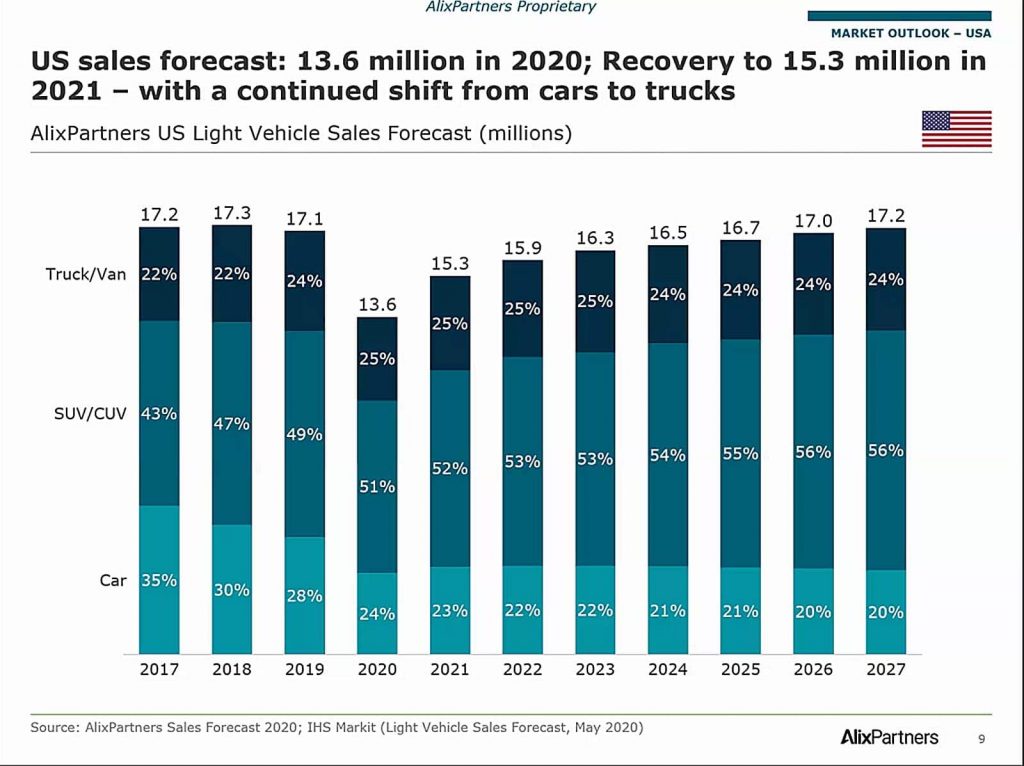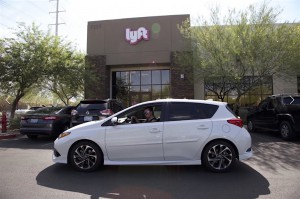
Sales of new vehicles are going to slide by 47 million vehicles during the next three years, predicts AlixPartners.
Doctors are starting to discover that COVID-19 can have long-lingering effects. That’s no surprise to the auto industry which is expected to feel the impact for years to come, according to a new study which anticipates global vehicle sales will fall about 47 million short of previous forecasts during just the next three years alone.
The pandemic’s effects will be felt across the industry and, indeed, around the world, with demand expected to fall to 70.5 million this year, off from the record 94 million which the industry isn’t expected to come close to again until the second half of this decade, predicted consultancy AlixPartners, as part of its annual state-of-the-industry study. The U.S., meanwhile, will likely come in at barely 13 million – and could possibly dip as low as 12 million should the economic recovery lag, said Mark Wakefield, the firm’s head of automotive operations.
The industry has been forced to pile up record debt, the study noted, taking on $72 billion in credit lines, term and other forms for debt during a 12-week burst. That is more than during the entire Great Recession, and will contribute to what Wakefield described as “a profit desert” that will likely stretch out for the foreseeable future.
(Mazda bucks industry trend, posts sales gain in May.)
The industry will need to adjust in an assortment of ways, according to members of the AlixPartners team which presented its findings during a Thursday-morning webinar. That includes cuts to structural costs, as well as investments in critical new technologies such as electric and autonomous vehicles.
 Among some of the key findings:
Among some of the key findings:
- Numerous products that were set to be rolled out this year will be pushed back to 2021, something several automakers have already confirmed;
- Where automakers where expected to invest a collective $234 billion in electric vehicle development efforts during the next five years, that now is likely to be trimmed to $200 billion;
- Spending on autonomous vehicle development also will be cut, with manufacturers focusing more on semi-autonomous, rather than fully driverless, vehicles for the time being;
- Structural cost cutting will be a critical goal for the industry, but that will likely translate into fewer jobs and lead to the closing of numerous plants around the world;
- As many as half of all automotive suppliers are financially “stressed,” with about 7% “distressed” to the point they may go bankrupt in the next year or two.
Part of the problem facing the auto industry is that the pandemic has broadly impacted a variety of different industrial sectors, noted Wakefield. The hardest hit is the travel business where airlines, hotels and other businesses could take years to recover. For the auto industry, meanwhile, that’s playing out with a massive cut in demand by rental fleets which could trim several million vehicles from original purchase plans in 2020.
(May sales to drop as fleet sales collapse.)

Ford Sales VP Mark LaNeve said the company isn’t expecting to be conducting much in the fleet sales segment anytime soon.
“We’re not going to be shipping cars to rental fleets for some time,” Mark LaNeve, the head of U.S. sales, service and marketing at Ford, told TheDetroitBureau.com last month.
Another sector facing serious troubles is the emerging ride-hailing business. “We see ride-hailing hit very hard,” said Wakefield. “This has been a real setback.”
That has been backed up by other studies, including recent ones by IBM and Capgemini, with some industry analysts questioning whether major players like Uber and Lyft – which were already posting massive losses before the pandemic – can survive.
What’s up for debate is how that will play out for the auto industry. With studies also showing that there likely will be less use of mass transit, that could help drive up demand for both new and used vehicles, according to some, though AlixPartners analyst Stefano Aversa said it is still unclear if that scenario will play out.
Asked whether the post-pandemic challenges could change the fundamental structure of the business, Aversa said it is very likely there will be “a couple of other” mergers among global automakers, along the lines of the deal being finalized by Fiat Chrysler Automobiles and PSA. And he said there likely will be an assortment of more targeted deals focusing specifically on product and technology programs, such as the ones that Volkswagen and Ford announced last year.
(VW completes $2.6B investment in Argo AI, teaming up with Ford on autonomous vehicle development.)
If there is anything good to emerge from the coronavirus, said Wakefield, it’s the fact that financial markets did not melt down as they did during the Great Recession, meaning there are loans available for qualified vehicle buyers – along with the debt being accumulated by manufacturers. But even there, some industry watchers are raising caution flags, especially with the decision by Wells Fargo this week to stop lending to independent auto dealers.
What’s clear, according to the new AlixPartners study, is that the auto industry has taken a massive hit that will take years to work through. In the meantime, manufacturers will have to struggle through slow sales and under hefty debt loads that will strain their ability to deliver even marginal profits.

